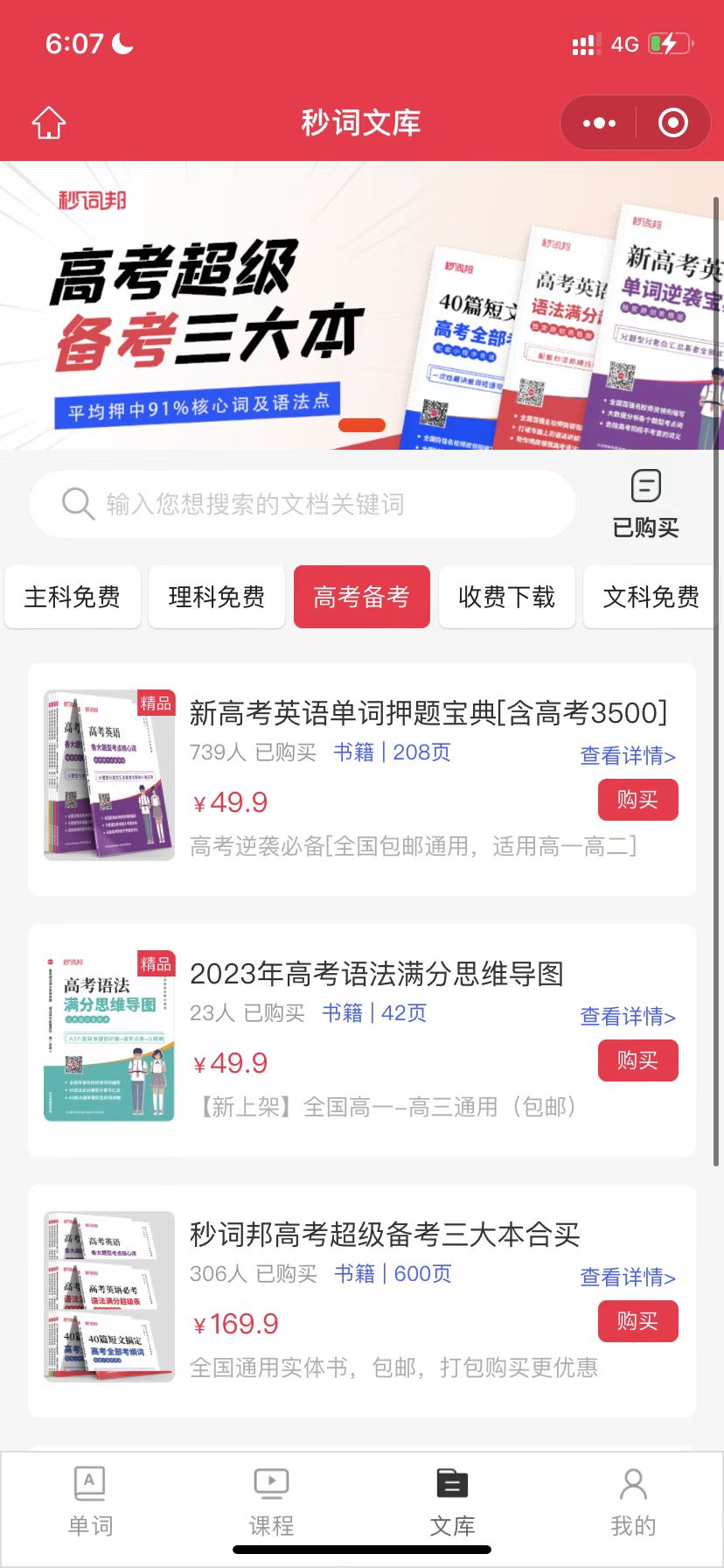单词很忙
分题型分考点背单词 文
文
Come on一 Everybody 9 s doing it. That whispered message, half invitation and half forcing, is what most of us think of when we hear the words peer pressure. It usually leads to no good一 drinking, drugs and casual sex. But in her new book Join the Club, Tina Rosenberg contends that peer pressure can also be a positive force through what she calls the social cure, in which organizations and officials use the power of group dynamics to help individuals improve their lives and possibly the world. Rosenberg, the recipient of a Pulitzer Prize, offers a host of examples of the social cure in action: In South Carolina, a state-sponsored antismoking program called Rage against the Haze sets out to make cigarettes uncool. In South Africa, an HIV-prevention initiative known as loveLife recruits young people to promote safe sex among their peers. The idea seems promising, and Rosenberg is a perceptive observer. Her critique of the lameness of many public-health campaigns is spot-on: they fail to mobilize peer pressure for healthy habits, and they demonstrate a seriously flawed understanding of psychology. ccDare to be different, please don't smoke! ” pleads one billboard campaign aimed at reducing smoking among teenagers - teenagersi who desire nothing more than fitting in. Rosenberg argues convincingly that public-health advocates ought to take a page from advertisers, so skilled at applying peer pressure. But on the general effectiveness of the social cure, Rosenberg is less persuasive. Join the Club is filled with too much irrelevant detail and not enough exploration of the social and biological factors that make peer pressure so powerful. The most glaring flaw of the social cure as it's presented here is that it doesn't work very well for very long. Rage Against the Haze failed once state funding was cut. evidence that the loveLife program produces lasting changes is limited and mixed. There's no doubt that our peer groups exert enormous influence on our behavior. An emerging body of research shows that positive health habits- as well as negative ones- spread through networks of friends via social communication. This is a subtle form of peer pressure: we unconsciously imitate the behavior we see every day. Far less certain, however, is how successfully experts and bureaucrats can select our peer groups and steer their activities in virtuous directions. Ifs like the teacher who breaks up the troublemakers in the back row by pairing them with better-behaved classmates. The tactic never really works. And thafs the problem with a social cure engineered from the outside: in the real world, as in school, we insist on choosing our own firiends.
来吧一 每个人都在这么做。当我们听到“同伴压力”这个词时,我们大多数人都会想到这种悄悄的信息,一半是邀请,一半是强迫。这通常不会带来什么好处一 酗酒、吸毒和随意性行为。但在她的新书《加入俱乐部》中,Tina Rosenberg认为,同伴压力也可以是一种积极的力量,通过她所说的社会治愈,组织和官员利用群体动力的力量来帮助个人改善生活,甚至可能改善世界。普利策奖获得者Rosenberg提供了一系列社会治疗的例子:在南卡罗来纳州,一项名为“愤怒对抗雾霾”的国家资助的反吸烟项目旨在让香烟变得不酷。在南非,一项名为loveLife的艾滋病毒预防倡议招募年轻人,在同龄人中推广安全性行为。这个想法似乎很有希望,罗森博格是一个敏锐的观察者。她对许多公共卫生运动的拙劣之处的批评很到位:它们未能调动同伴对健康习惯的压力,而且它们表明对心理学的理解存在严重缺陷。cc敢于与众不同,请不要吸烟!”罗森伯格为一场旨在减少青少年吸烟的广告牌运动辩护,这些青少年只想融入社会。罗森伯格令人信服地认为,公共卫生倡导者应该借鉴广告商的经验,因为他们非常善于施加同龄人的压力。但在社会治疗的总体有效性方面,罗森伯格的说服力较弱。加入俱乐部充满了太多不相关的细节,而对使同伴压力如此强大的社会和生物因素的探索却不够。这里介绍的社会疗法最明显的缺陷是,它在很长一段时间内都不起作用。一旦国家资金被削减,“愤怒对抗阴霾”就失败了。爱情生活计划产生持久变化的证据是有限的,也是混杂的。毫无疑问,我们的同龄人对我们的行为产生了巨大的影响。一项新兴的研究表明,积极的健康习惯和消极的健康习惯都会通过社交网络传播。这是一种微妙的同伴压力:我们无意识地模仿我们每天看到的行为。然而,不太确定的是,专家和官僚们如何成功地选择我们的同行群体,并引导他们的活动朝着良性的方向发展。我喜欢老师把后排的捣乱分子和表现更好的同学配对,以此来拆散他们。这种策略从未真正奏效。并通过从外部设计的社会疗法来解决这个问题:在现实世界中,就像在学校里一样,我们坚持选择自己的宿舍。
句子成分分析:
Her critique (of the lameness (of many public-health campaigns)) is spot-on: they fail to mobilize peer pressure [for healthy habits], || and they demonstrate a seriously flawed understanding (of psychology).
句子语法结构详解:
* is 为系动词作谓语,采用一般现在时。
* spot-on 为形容词作表语。
* fail 为谓语,采用一般现在时。
* to mobilize 为不定式,作宾语。
* and 为并列连词,连接并列句。
* demonstrate 为谓语,采用一般现在时。
* flawed 为过去分词作定语
* they 为人称代词主格。her 为形容词型物主代词。the 为定冠词。a 为不定冠词。
句子相关词汇解释:
Phrase:
fail to do sth | 未能..., 无法... |
Vocabulary:
critique [kri'ti:k] | n. | 评论;评论文章 |
lameness ['leimnis] | n. | 跛, 瘸, 残废 |
many ['meni] | a. | 许多, 很多 |
campaign [kæm'pein] | n. | 1) 运动 2) 战役 |
mobilize ['mәubilaiz] | vt. | 1) 组织,鼓动,动员 2) 调动,调用 |
peer [piә] | n. | 1) 身份(或地位)相同的人,同龄人,同辈 2) (英国)贵族成员 |
pressure ['preʃә] | n. | 1) 压力,挤压 2) 压力,压强 |
healthy ['helθi] | a. | 1) 健康的,健壮的 2) 有益于健康的 |
habit ['hæbit] | n. | 1) 习惯 2) 习性 |
demonstrate ['demәnstreit] | vt. | 1) 证明,证实,论证,说明 2) 示范,演示 |
ad. | 1) 严重地,严肃地,认真地 2) 非常,极其 | |
understanding [,ʌndә'stændiŋ] | n. | 1) 理解,了解 2) 协议 |
psychology [sai'kɔlәdʒi] | n. | 1) 心理学 2) 心理,心理特征 |
句子成分分析:
[In South Africa], an HIV-prevention initiative known [as loveLife] recruits young people to promote safe sex [among their peers].
句子语法结构详解:
(known 为 know 的过去分词。)
* known 为过去分词,作后置定语。
* recruits 为谓语,采用一般现在时。动词采用第三人称单数形式。
* to promote 为不定式,作状语。
* their 为形容词型物主代词。an 为不定冠词。
句子相关词汇解释:
Phrase:
South Africa | 南非 |
be known as... | 被称为..., 被认为是..., 以...而著称 |
safe sex | 安全性交(采取针对艾滋病和其他性病的预防措施) |
Vocabulary:
initiative [i'niʃiәtiv] | n. | 1) (the initiative)掌握有利条件的能力(或机会),主动权 2) 倡议,新方案 |
recruit [ri'kru:t] | vt. | 恢复, 补充, 充实, 征募 |
young [jʌŋ] | a. | 1) 年轻的,岁数不大的,相对年轻的 2) 幼小的,未成熟的 |
people ['pi:pl] | n. | 1) 人,人们,大家 2) 国民,人民,臣民,群众 |
promote [prәu'mәut] | vt. | 1) 促进,推动 2) 促销,推销 |
among [ә'mʌŋ] | prep. | 1) 在(其)中,...之一 2) 在...之中,周围是... |
peer [piә] | n. | 1) 身份(或地位)相同的人,同龄人,同辈 2) (英国)贵族成员 |
句子成分分析:
An emerging body (of research) shows | that positive health habits- as well as negative ones- spread through networks (of friends) [via social communication].
句子语法结构详解:
* emerging 为现在分词作定语
* shows 为谓语,采用一般现在时。动词采用第三人称单数形式。
* that 为连词,引导宾语从句。
* spread 为谓语。
* an 为不定冠词。
句子相关词汇解释:
Phrase:
as well as | 和,也 |
Vocabulary:
emerge [i'mә:dʒ] | vi. | 1) (从暗处或隐蔽处)出现,浮现,露出 2) (事实、意见等)暴露,露出真相,被知晓 |
body ['bɔdi] | n. | 1) 身体,躯体 2) 尸体 |
research [ri'sә:tʃ] | n. | 研究,调查,探索 |
show [ʃәu] | vt. | 1) 显示出,流露出(情感、表情等) 2) 表明,显示, 证明 |
positive ['pɔzitiv] | a. | 1) 良好的,正面的,有益的 2) 乐观的,积极乐观的 3) 积极的,建设性的 |
health ['helθ] | n. | 1) 健康,身体状况 2) 医疗,保健 |
negative ['negәtiv] | a. | 1) 否定的 2) 消极的,负面的 |
spread [spred] | vi. | 1) 蔓延, 扩散, 散布 2) 传播, 流传, 散布 |
through [θru:] | prep. | 1) 借助,凭借,通过,经由 2) 从某物的一端到另一端, 穿透, 通过 |
network ['netwә:k] | n. | 1) 网络,网状系统 2) 关系网,人际网,相互关系(或配合)的系统 |
friend [frend] | n. | 1) 朋友 2) 支持者 |
via [vaiә] | prep. | 经由, 经过, 通过 |
social ['sәuʃәl] | a. | 1) 社会的 2) 社会上的,社会地位的 |
communication [kә,mju:ni'keiʃәn] | n. | 1) 联络,通讯 2) 交流,交际 |

以上是蜂贝为您整理编写的文章《考研英语之阅读理解文段精选详解第025篇——蜂贝微信小程序》的全部内容。蜂贝是国内权威分题型分考点背诵中高考/四六级考研/专升本/出国单词的专业单词软件。扫描如下小程序码,进入蜂贝官方小程序获取更多英语相关资料! 【关键词:高考单词;高考英语;高中单词;高中英语;单词app;单词软件;记单词app;记单词软件;背单词软件;背单词app;英语单词;四六级单词;四六级英语;四六级单词app;四六级单词软件;考研单词app;考研单词软件;核心单词;高考冲刺复习;高考英语教材;高考英语真题;四六级真题;四六级试题;考研真题;考研英语单词;考研英语真题】





